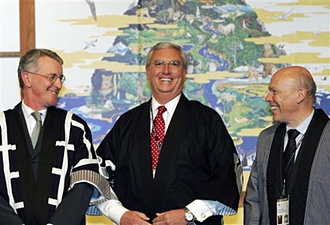
|
 |
 |
 Editorials | Environmental | May 2008 Editorials | Environmental | May 2008  
G-8 Supports Mexican Proposal to Create Green Fund
 PVNN PVNN


| | G-8 environment ministers, from left, Hilary Benn, of Britain, Stephen Johnson, administrator of the U.S. Environmental Protection Agency, and Jos Delbeke, deputy director general of EU, are all smiles during a photo session of the G8 Environment Ministers Meeting in Kobe, western Japan, on Saturday, May 24, 2008. (AP/Koji Sasahara) | | |
Mexico City - Due to its international importance, Mexico’s proposal to create a Green Fund to Combat Climate Change will be included in the final press release of the Group of Eight (G8) and Group of Five (G5) Environmental Ministers Meeting in Kobe, Japan, which ends today.

Secretary of the Environment and Natural Resources Juan Rafael Elvira Quesada, who leads the Mexican delegation participating in this meeting, stated that the Mexican initiative was welcomed, since it is comes from the country that is making the fourth largest effort to combat climate change and is attempting to involve the entire international community in this endeavor.

Our position in the world gives us a strategic edge, added the government official, since Mexico has the “moral responsibility” to warn of the negative effects of global warming and to serve as an example to other countries with less experience in dealing with the effects of this problem, such as hurricanes and cyclones.

“If we do not take decisive measures now, we will regret this in the future. Nowadays we have a patient at home, Planet Earth, which has a high temperature, which is causing a great deal of severe damage. That became very clear to us after last year's floods in Villahermosa, Tabasco," said the SEMARNAT director.

For his part, Canadian Environment Minister John Baird acknowledged Mexico’s efforts to combat this problem. “Canada is grateful for and supports the Mexican government’s commitment to combat climate change and its efforts at this meeting,” he declared.

Ichiro Kamoshita, Japanese Environment Minister, highlighted the importance of the Mexican proposal to create a Green Fund, adding that this was why it had been decided to include it in the last press release at the meeting, since advanced countries are obliged to finance the development of emerging nations.

G8 and European Union Environment Ministers from the following countries participated in the meeting, which ends today: Japan, Canada, France, Germany, Italy, Russia, United Kingdom, the United States, the European Commission (EC) and Slovenia.

The meeting was also attended by the Ministers of Mexico, Antigua and Barbuda, Australia, Brazil, China, India, Indonesia, the Republic of Korea and South Africa.

and representatives of international organizations, such as: The United Nations Environment Programme (UNEP), the Global Environment Facility (GEF), the Organization for Economic Cooperation and Development (OECD), the United Nations Framework Convention on Climate Change (UNFCCC), the International Union for Conservation of Nature (IUCN) and the Secretariat of the Basel Convention.

The Semarnat director announced that Mexico will attempt to reach a common position on global warming with China, India, South Africa and Brazil, the countries comprising G-5,in order to submit it at the Summit of G-8 and G-5 Heads of State and Government, to be held in Hokkaido, Japan from July 7-9, in which President Felipe Calderón will participate.

Elvira Quesada said that the Kyoto Protocol has proved insufficient, which is why a solution must be reached to include the collaboration of developed nations, responsible for 52% of emissions and developing nations, responsible for 48% of pollution.

He acknowledged the fact that a great deal remains to be done regarding global warming "and although G-8 and G-5 are strategically important, climate change is an issue that affects every country in the world.”

During his explanation of the way the Green Fund operates, the SEMARNAT director said that this mechanism will include every country in the world and that the percentage to be contributed by each nation will be determined by the overall percentage of each country's emissions, the percentage of their inhabitants' per capita emissions and their Gross Domestic Product (GDP).

The Fund, he added, will have a minimum budget of one billion dollars which can be upgraded or expanded and will be managed by United Nations.

That is why it will use the World Bank or Inter-American Development Bank structure and in principle, all countries will be able to withdraw money to undertake activities to mitigate climate change, provided they are real, measurable, verifiable and reportable.

This, added the Secretary, will ensure that what developed countries contribute is more than what they can withdraw, in order to create a surplus that will serve and help to encourage developing countries to undertake expanded mitigation activities.

On the other hand, he added, intermediate developed countries, such as Mexico, can not only withdraw exactly what they contributed but also an additional amount to enable them to make a greater effort than their own resources would permit.

He added that with a minimum contribution, small nations will be able to obtain a proportionately large benefit in order to carry out mitigation activities.

Source: Media and Communications Office. Information Department. Secretariat of the Environment and Natural Resources (SEMARNAT). | 
 | |
 |



